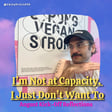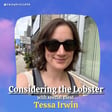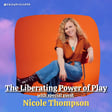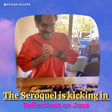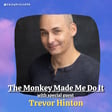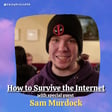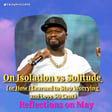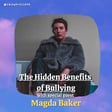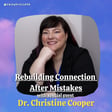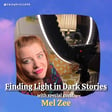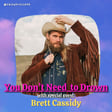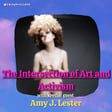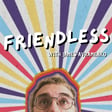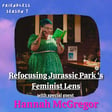Become a Creator today!Start creating today - Share your story with the world!
Start for free
00:00:00
00:00:01

So you've been diagnosed with ADHD...(with special guest Shanda Stefanson)
This week on a very special episode of Friendless, your pal James Avramenko is joined by returning guest Shanda Stefanson!
They discuss shifting focus away from their old poetry circles, dealing with later life ADHD diagnoses, and making friends when you have social anxiety.
Read "Hey, sorry I missed you"
Support the show, Buy Me A Coffee!!
Transcript
Introduction and Episode Overview
00:00:08
Speaker
Well, hey there, sweet peas. Welcome back to Friendless. I'm your host, James Avramenko, back once again with a brand new episode with very special returning guest, Shanda Steffensen. Shanda and I celebrate her brand new ADHD diagnosis. We discuss shifting our careers away from poetry, and we talk about the struggles of making friends later in life.
00:00:33
Speaker
All that and so much more. It was such a treat catching up with Shanda, and I know you're gonna love this episode. So for now, lean back, get comfy, set your volume at a reasonable level, and enjoy my interview with the one and only Shanda Steffensen here on Friendless.
James' Humorous Bed Mystery
00:00:47
Speaker
So this week on Friendless, I have the return of a former guest of the show and a dear friend of mine from back in Saskatoon, the one, the only Shanda Steffensen. How are you today? It has been forever.
00:01:01
Speaker
I'm good. Yeah, it has been forever. How are you, James? I'm good. I got like a funny I got a little bit of a late start today. I there's these funny things going on in my apartment that I cannot for the life of me get to the bottom of my like late at night. My my bed like just like vibrates constantly. And I can't tell if it's like someone doing like laundry late at night or if it's like someone has like a
00:01:29
Speaker
like a massage chair or something like that, you know, because it's just this constant vibration. And sometimes it goes on for hours. And my landlord has gone to other suites and asked around and nobody feels it and nobody knows what they're talking about. And so it's just this mystery, you know? It's ghosts.
00:01:49
Speaker
That's what I said. I was like, oh, you know. But but yeah, no, so that's that's I was like, I was up like late, like like knocking on walls and trying to get people to shut the fuck up. And no one was.
Shanda's Life Reflections and Changes
00:02:07
Speaker
So, geez. So, Shanda, you know, as I mentioned, you have been a previous guest, but
00:02:16
Speaker
for anyone who may not be familiar with you. I always love starting interviews with a very blunt question of who the hell are you? Oh, gosh, that's like the quintessential question. Short answer, I don't know. Yeah, I mean, when we first met and became friends, I was really involved in like the spoken word and poetry community and
00:02:44
Speaker
theater and stuff like that. But I don't know, a lot has changed. The world has changed. My life has changed.
Understanding ADHD Diagnosis
00:02:50
Speaker
Your life has changed. And I don't know, these days I like work and stay home and like adore my cat and like hang out with
00:03:03
Speaker
my husband who's also been on your podcast and I don't know, who am I? I don't know. I love, this is like, since introducing this question, it's become one of my favorite like segments of the show because it can spark so much like existential angst, but it also is like really beautiful. It's something that I really love about the question, about all these questions is like,
00:03:32
Speaker
I love seeing where the impulse of the question takes the question-y, you know? And I never want to cause pain, I never want to cause, you know, but it's like, it's almost interesting to think about how
00:03:47
Speaker
how close to the surface the uncertainty of these things are, you know? And yet we all, I think, collectively, like, just try to, like, kind of ignore it, you know? Yeah, totally. Yeah, what, like, what is that? What did? Yeah, I don't know. It's actually something that's been, like, kind of forefront
00:04:14
Speaker
randomly that we're talking about it now, but it's something I've been questioning a lot lately because about three months ago I got diagnosed with ADHD.
Impact of Trauma and ADHD on Life
00:04:22
Speaker
Hmm. Congratulations. Yeah. And, um, it's like, so my whole personality was just a lack of dopamine. So I'm not quirky. I'm just like need to be medicated. Like, so, and this question of like,
00:04:43
Speaker
Are we just a collection of our hormones and electric impulses in our brain? Yeah. So yeah, it's been something that I'm not struggling with, but it's been on my mind. What does this mean for who I am? What does it mean for my future? What does it mean for retroactively looking at all the choices or non-choices that I made in my life?
ADHD: Perception and Coping Strategies
00:05:12
Speaker
How has that been feeling for you? I know for me, when I was diagnosed a couple of years ago, there ended up being, there was this sort of like initial real peak of excitement because I was like, oh, oh, that, okay. I see myself a little better now. And then there was this really sudden drop of like mourning, you know, and sadness about like realizing
00:05:37
Speaker
how much I'd been struggling without even knowing it and how much I felt I'd lost out on and all those paths and all those lives that I was like punishing myself for not living or leading but also recognizing like that was never going to be possible and so having to really reconcile all that stuff and it's ongoing for me but like but how has that been landing for you lately? Yeah kind of the same it was like
00:06:06
Speaker
Um, like I actually started down the path of trying to get a diagnosis because my niece was diagnosed a couple of years ago. She's 19. And just like hearing her talk about it, I was like, that's me. And especially for women and girls, it's so different than like the uninformed person believes what ADHD is. It doesn't present like that at all, especially in girls and women. And so.
00:06:37
Speaker
just be, you know, I did all this research into it and watched all the YouTubers and was just like, like, it makes so much sense. And kind of that same thing, like, if somebody had figured this out, like 20 years ago, like where, where would my life have gone? And it was interesting too, because I was in high school, I was like a real go-getter.
00:07:06
Speaker
I did everything, you know, I had good grades, all of the things. And then in my tail end of my second year of university, my sister passed away and it was like this sharp change where I couldn't get myself to do anything. I would stay up until four in the morning watching law and order reruns and like drag my ass to class and like sleep through half my classes. And like, it's like, it's like,
00:07:33
Speaker
like the trauma and the grief and all of that just kind of like flipped a switch on to like on. And I just got, you know, I was coping and then it was just like, I wasn't, you know? And then now I'm in my forties and like, para menopause and like the pandemic and the stress and like it's same kind of thing. I just was like shut down. I am not coping with anything.
Thriving with ADHD: Medication and Counseling
00:08:01
Speaker
So,
00:08:02
Speaker
Yeah, it was very much like, yeah, I was excited to finally have an answer for why, like I'm not just a piece of shit. I'm not just bad at adulting, bad at humaning. You know, there's like something legitimately, physically wrong with my brain. But then yeah, this, like you said, like a morning, like this deep sadness for like what could have been. And, um,
00:08:32
Speaker
Like one of my therapists that I've seen over the years was, you know, whenever I would get into these, like, what could have been, she's like, you're just going to like, what if yourself to death? Like, yeah, like what if you had bought a winning lottery ticket seven years ago? Like there's a million what ifs, right? So I'm trying to just really focus on like what it means for my future and what this knowledge and, you know,
00:09:01
Speaker
I'm seeing like an ADHD counselor and like on medication and I'm doing a lot better. Like I feel like I'm thriving in a way that I haven't in a really long time.
Questioning Societal Norms on Neurodiversity
00:09:12
Speaker
So it's, yeah, it's exciting, but also just like,
00:09:17
Speaker
How the fuck did nobody catch this? I hear this in myself all the time and when I hear other people say it aloud too, it really catches my ear.
00:09:33
Speaker
is framing it in ourselves as our brains are wrong or our brains are broken, right? You know, there's something wrong with my brain and there isn't. It's just how your brain ends. You know, yeah. As far as I'm concerned, too, the more I research, the more I learn about it, the more I recognize that if we're going to frame it as good or bad, which I try my best to not in any case. But if we're going to, I would actually much prefer, you know, sort of a
00:10:00
Speaker
I use the blankets of like, allistic and autistic, even though like autism and ADHD are more just comorbidities, they're not exactly one to one. But like, for simplicity, I usually use those framings, you know, and I, I would substantially prefer an autistic brain over an allistic brain, you know, because
00:10:18
Speaker
Just because a brain can function within a society or a system like capitalism doesn't make it good. In fact, that makes it a very scary brain. And I think something like an autistic brain, which is designed, if you really look at it, for a type of state that the natural human seems to be more built for, a little bit more hunter-gatherer,
00:10:41
Speaker
a little more like, you know, the ability to multitask and the ability to be aware of things that others wouldn't be, you know, that's really good for the group, right? And so it's actually, I think it's a really beautiful brain formation. And I just recognize that it makes surviving in this system so much harder,
Creativity, Self-Worth, and ADHD
00:11:01
Speaker
you know? Yeah, yeah.
00:11:03
Speaker
And I just I was trying to just blame it as like, you're not broken. There's nothing to fix. You know, there's nothing to fix. We just we also do play within a system and a set of rules that makes our lives substantially harder. You know, and and and so we get to decide like like you say about our future, you know, so we could decide like so how do we cope and how much of the game do we buy into, you know, for our survival and how much of it do we say? Yeah, fuck all that noise. You know.
00:11:31
Speaker
Yeah, I know. Like I was like, I've been. I've been a square peg, trying to fit myself into a round hole my whole life. Yes. And it's like, just be a square peg. Find a square hole, you know. Exactly. So, yeah, it's it's been like freeing and. Yeah, in in ways that like. Yeah, I don't know.
00:12:00
Speaker
It's only been like three months and it's been a quick sort of like hyper focus was my new hyper focus. But yeah, it's like, things make so much sense now, like all the ways my life has
00:12:21
Speaker
shaped up kind of thing.
Pandemic's Effect on Creativity
00:12:23
Speaker
So well and the creativity you know and I think I think and that's another element that it's like I don't I know I wouldn't be as creative as I am without my my autistic brain you know and so I really cherish that because I cherish my creativity you know and so it's like yeah okay I can't hold down an office job I can't do it but like gives a fuck no one should no one should be able to do that you know like yeah it's funny because I was um
00:12:51
Speaker
I'm like, I work in healthcare and there's an occupational therapist that I work. I don't work in the office anymore, but when I was, and I was going through this journey and I was talking with her a lot about it. And she's like, so do you find that your symptoms are like interfering with like your work in your daily life? And I was like, well, at work I go pretty well. I'm pretty good at like.
00:13:14
Speaker
masking, I guess. And I mean, I have sort of like a constant low grade panic attack all day. But I'm, but I'm like functioning pretty well. She's like, that doesn't sound like functioning well. Like, oh yeah. I'm just so used to it that it feels normal. So the idea of like, yeah, that, that low grade anxiety always being present. Like that's not, that's not what being alive is, you know, alive isn't being afraid. I know.
00:13:45
Speaker
mind-blowing. Speaking on the creativity end, you're someone who is a beautiful poet and has done so much work within the art community and I know that there was so much, I think even before the
00:14:04
Speaker
pandemic, things were already kind of shifting away. And I know a lot of, like when I showed up in Saskatoon, the scene was already sort of like, not like completely breaking up, but it was shifting and it was changing. And who had been a part of it was sort of moving out. And there was a new sort of a new wave of people who I don't think either of us had, forgive me, I'm not meaning to speak for you, but like,
00:14:25
Speaker
I got the impression neither of us had much interest in participating in the new scene, you know? And I'm curious in the, you know, the following years, have you been maintaining any kind of personal practice or have you been working on anything outside or how has that been going for you? No, it hasn't been going at all. No, no. No. Yeah, I know. The pandemic really fucked me. Like I was
00:14:55
Speaker
Yeah, I was not okay. And I feel like for like three years, I was just in like survival mode. And it was like, do what you need to do to get through the day. And work was so stressful. And then, you know, all this other ADHD and everything on top of it. And, um, like working in healthcare and, you know, so yeah, I just was like survival mode and I
00:15:25
Speaker
both Steven and I have had a really hard time just like getting back into like thriving mode, like doing the things that we enjoy. And yeah, the other day I was like,
00:15:39
Speaker
Didn't we used to do things? Like what did we do? Cause like now it's like, what do you want to do today? We go shopping because for so long that's all you could do. That's right. It was the only thing open. So you just go. So I'm like, I'm sure we did things like this wasn't our life before. So yeah, I feel like Steve and I are both really on, on the cusp of like, we really want to,
00:16:08
Speaker
like examine our life and decide like, what's important to us and what we want. Instead of just kind of like, coasting, we want to like invest in, I don't know, invest in our lives, invest in our relationship ourselves and yeah, and figure out
00:16:26
Speaker
how to not just survive anymore, you know?
Creative Work for Fulfillment vs. Success
00:16:29
Speaker
Yeah. Well, and you know, it's also the thing, you know, coming back to something we just talked about is that it's like, you know, something I work on with my therapist all the time in undoing those like shame spirals and in breaking those loops is recognizing that like,
00:16:44
Speaker
to be able to feel anxiety means you're alive and to be alive means that you have some sort of future you know like like the future is only done when you're dead you know and and at that point it won't matter you know so so it's like there there you know there there can be some very very uh quick like existential dread behind that but you know because of the nature of our brains you know like you said about
00:17:13
Speaker
you're able to see worst case scenario is really fast. And that's, that's a product of the ADHD brain is to be able to see connections and then jump to conclusions and synthesis really fast, you know? And so you hear one thing and you're, you know, you hear point A and your brain can jump to point G in an instant, you know? And, and, and it's, and, and for me, it's about
00:17:36
Speaker
processing back to like okay we're only gonna get ourselves to point B and that's it and that's all we're gonna worry about right now because that's the only step we have everything else is just theoretical you know and and recognizing that there are so many societal myths around
00:17:51
Speaker
when you can be successful and when you can start living and when you have to stop living and when you have to give up a dream and when you can no longer have that dream, you know? And I often frame that around art, you know, because there's all the myths of if you haven't made it before whatever age, you'll never make it. And my question right now for myself has been, and maybe I'll even kind of open this up to you to answer if you're comfortable with it, is like,
00:18:19
Speaker
What even is making it you know like like what success is it is it I? Wrote a song or is it I got to play a song in a stadium You know like like what is what is success to the creative impulse? Yeah, well and that's something that like coming from like slam hmm doing poetry slams and like
00:18:43
Speaker
having a constant like, Oh, if I read this new poem, we're going to perform it or, and get scored on it. And like, it, uh, did such fucked up things to my like creative practice. It's, it's almost like, like I would never want to have a job as a creative person, just because trying, like making something you're living just changes the relationship to it so much. But then it's also like.
00:19:12
Speaker
And maybe it's ADHD, but I, like, I only worked a deadline, you know, I don't just do things. Well, certain things like playing video games for five hours a day, but like, you know, I need, you know, it's the, like, I have to have a place for it to go almost like I'm, it's, I find it so hard to just like, I'm going to write this and then like, nobody will ever see it or read it. Like, so.
00:19:39
Speaker
I've been talking with my therapist a lot about this too, where it's just like, what, like, can't you just do it? Just cause if like it helps you or if it feels nice or, you know, doesn't, does it matter if no one's ever going to see it? And yeah, like, what, yeah, what is, I like, I don't care about like success. You know, I don't want to be famous. I don't want to be rich. I just want to.
00:20:08
Speaker
Like a happy, comfortable life, which that's, it's a whole nother thing. Like putting pressure on yourself to be happy is a whole other discussion. Yeah, but yeah, I don't know. I still, like, I still have creative impulses and there's like, there's definitely something lacking in my life when I'm not.
00:20:36
Speaker
doing, you know, and it's been so many different things over my life. Like I would play guitar and write songs or then I did poetry and playwriting and I did like collage art and like sewing and cross stitch. And I only recently figured out I had ADHD. The signs are all there. But anyway, but just to have something cooking, you know, anything, just some kind of way
00:21:05
Speaker
to take the things inside of me and put them outside of me. And my mental, spiritual, whatever health is definitely suffered
00:21:33
Speaker
from not doing
00:21:36
Speaker
to me I mean there's many you know art is obviously one of those nebulous terms and it's many many many things but to me and my creative and artistic practice it's it's catharsis for me you know it's getting experiences thoughts impulses out of my body and onto something else out of me you know and and you know so so um
00:22:00
Speaker
It's it's rarely been, you know, I still harbor, you know, I still harbor deep, like very, very traumatized framings of like wanting to be a cool kid, you know, wanting to be a part of the cool kid group, wanting to wanting to be validated, wanting to be seen, you know, and and accepted. And and and, you know, when I was young, I tied that up with art. Right. And I tied up.
00:22:21
Speaker
if this poem goes well, or if I perform this monologue, or if I sing this song, whatever, then I'll be loved, you know? And I'm really working to untangle those sentiments, but that's gonna take years, you know? And it'll still like, even as I try to unpack it, there's still these little lingerings like, yeah, but what if? You know, right?
00:22:47
Speaker
And I just, yeah, I think for me, it's becoming now of just getting back to the, I always kind of roll my eyes when people are going to the gym as my therapy, or writing poetry as my therapy, and I'm like, no, my therapy's my therapy. But part of my therapeutic practice is writing poetry. Or painting is part of my practice.
00:23:13
Speaker
this you know and and and I think I think you know I'm not trying to say go do this I guess I'm just this again another ADHD impulse is like hearing a thing and so I'm telling a story about myself because that relates to it you know is like is like for me is coming back to the like I'm gonna do this because it makes me feel better when it's done
00:23:36
Speaker
And also on the other side, too, like the idea of like a deadline or the idea of meaning in general is arbitrary and fiction. So like just make up a deadline, you know, because it's all made up. Doesn't work that way, though, if it's like.
00:23:54
Speaker
self-imposed made-up deadline somehow it just doesn't have the same effect but Does it feel good? I'm not meaning to spit into like let's coach you or anything like but like Does it help if you like tell someone what the deadline is and then make them? Kind of come into it because that's helped me in the past maybe I don't know. I don't mean to suddenly You know on that end
00:24:21
Speaker
I think that spins to one of the sort of like spine questions of the show is you know these questions of friendship and what does it mean to be a friend and you know as I've told this story countless times on the show but it's like you know
00:24:35
Speaker
So much of the spirit of the show has come down to questioning whether or not I've been a good friend. And through my recent years journey of this diagnosis, I've recognized like what a part my neurodivergent brain has played in that and how much a neurodivergent brain struggles to make and maintain friends and how it's like always being the weird kid who would have a friend for a year and then
00:24:58
Speaker
having a like a meltdown or having some kind of, you know, autistic screeching and then suddenly like, you know, that suddenly I don't have those friends again, you know? Yeah. And taking the blame on for myself. Right. And and I guess I guess to you, what does it mean to be a friend, especially with everything you're learning about about yourself?
ADHD and Friendship Dynamics
00:25:21
Speaker
Yeah, that that's a really tough question.
00:25:25
Speaker
Honestly, like I'm kind of in the same vein as what you just said, like it's like out of sight, out of mind. Like if you're not in front of me, you don't exist, right? And that's totally an ADHD thing, but I'm so good at like situational friendships or like, like show mances, but friends, you know, like people I work with or, you know, you're on a project together and I'm just like,
00:25:53
Speaker
get super close with these people and then it's like, oh, I'm going to be so sad when this is over. And then I'm not like two days later, it's like it never happened. Right. And, um, yeah, I really struggle maintaining friendships and like, you know, there's that sort of cliche where it's like, Oh, I haven't seen you in two years, but we sit down and it's like, we've, it's yesterday, you know? And, um, but like, yeah, yeah.
00:26:23
Speaker
But what does it mean to be there for someone? What does it mean to, like, my brother has a really close group of friends. They're like, either ride or die kind of thing. And he has a Christmas party every year. And he always invites me and Steven. And he's like seven years younger than me, so the crowd is a little, like,
00:26:51
Speaker
He's pushing 40 now, but like, you know, it's sometimes I'm like, I can't party with 20 year olds anymore, you know, but we always go and whatever. And I, you know, by the time I've had two or three drinks, I'm always just like, his tribe is just so there for him. And I always like tear up and like, I have to like leave because I'm going to ruin the party. But I just seeing him with his friends and they all like, they're like,
00:27:19
Speaker
introduce themselves and like, oh, you know, I'm Levi's sister and they're like, oh, your brother's so awesome. Like, and I'm just like, I don't have that. I never have. And like, Hey, I'm just so happy for him that he does. And he is such an amazing guy and all these people are just like there for him and he's there for them. And, but I'm just like, I don't even know. I can't even imagine what that's like. Like if I won a contest that was like,
00:27:49
Speaker
bring eight friends, I would be like, I don't, who am I going to play to? Yeah, exactly. But yet there's so many people that I look back in my life and I'm just so grateful that they played such a huge role in my life at the time. And, um, just because that I've, I've drifted away doesn't mean it's less meaningful to me or that they made less of an impact on me. And, um,
00:28:20
Speaker
Like, I don't know how to, how to like reciprocate that. I have no idea if those relationships were as meaningful to them as they were to me. You know, I have no idea if I have just walked through life, just take, take, take, take, taking from all these people. And did they get anything in return? You know, so I, so
00:28:47
Speaker
I mean, I like to think I know like the dictionary definition of a friend. I hope I've been that to someone, you know, but I really, like, I don't think I'm anybody's ride or die except maybe like Steven. And I don't, like maybe, I don't know. Maybe if he was in crisis, he wouldn't come to me because he'd be like,
00:29:16
Speaker
gestures vaguely. Like, did he go to someone who has their shit together a little better? I don't know. But like, yeah, so I don't know.
Forming New Friendships with ADHD
00:29:27
Speaker
Yeah, there have been so you know, and I traveled for quite a few years after university. And so, like, literally all over the world, there's dozens of people that I like think about a lot, who like helped me and who meant a lot to me. But
00:29:44
Speaker
I haven't spoken to them in a decade kind of thing. So yeah. I mean, that's your, like I say, that's my inner monologue is this question of like, it's what that spirit of that question is. It's like, have I been a friend? Like, I'd like, what even like the fuck does that even mean? You know, like, and, and, and, and I'm so you're, you're, oh my God, you're just vocalizing so many of my inner turmoils of like,
00:30:10
Speaker
I think so fondly about all the people who have been in my life and all the things they've done for me and all the things that I've tried to do for them and all the ways I hold them so tenderly in my heart. And then I also am like, when it's not there, did it matter? Did it mean anything? And I'm trying really hard to say, like I'm trying really hard. It's another therapy tactic is what Scott, my guy, he gets me to do is,
00:30:38
Speaker
You look at a situation for only what it is and not for, you know, not compared to anything else, not weighted against another experience, not, you know, this is better than that. This is worse than that. Just you just let it be it. And there's no meaning other than what you ascribe to it. So why not give it no meaning, you know, because there is no meaning to anything. It's just you just were alive, you know. And.
00:31:04
Speaker
Again, it brings out this joy and excitement, but it also brings out such a deep sadness because I agree. And this is something I've been really struggling with with this show recently, is interviewing people who have these really deep intimate groups who go back years and they always recommend like, yeah, just put the time in. And it's like,
00:31:27
Speaker
I am 36 when I when I put in 10 years of work I'm gonna be almost 50 and so like cool okay you know and and you know there's there's a there's a there's a cynicism to that and there's a pressure to that but it's also like well
00:31:43
Speaker
Should I be so lucky to be alive at almost 50? And that would be great to have a group of friends at almost 50. So why would I be resistant to it? It's these cyclical spins. I'm really vocalizing my inner shame spiral here. You just always find the like, what's the roadblock? What's the roadblock? But it feels like a pinball machine. Yeah. But I mean,
00:32:12
Speaker
No, back to ADHD. But being unable to imagine yourself having your future is an ADHD thing. So. Like being able to say, if I put in the work now when I'm 50, I'll have a group of friends. Forget about it means nothing. Yeah. It's like, unless it's going to give me some kind of validation or excitement or something right now.
00:32:40
Speaker
It's like, yeah, can't do it. Yeah. Well, and that's something I've been really struggling with is in moving to a new city and in trying to make new friends, you know.
00:32:51
Speaker
I've been really desperate. I've been admittedly very, very frantic at times to be like, let's get into it now, you know, like let's be 10 year friends in 10 seconds, you know, so that I have someone because I'm so fucking alone and I'm so fucking lonely, you know, and that's just not how you make friends, you know? No, not usually, no.
00:33:18
Speaker
Unless you find another freak, you know? Or in artificial situations, like when I was teaching in Korea and I had like 10 other expats that I worked with, it was like, okay, these are your friends now. And it was that sort of situation. But like, yeah, normal life doesn't really work that way.
00:33:41
Speaker
This is a new question I've been incorporating off and on throughout the new interviews that I dovetail from this question of how, especially at our ages, how do you make friends? How do you do it? I don't know. My tactics have seemed to be oversharing.
00:34:05
Speaker
um um like like hyper focusing on people which um comes across as like aggressive and often mistaken for like sexual advances yes yes which it never is mostly never um um like i don't know many how many times i've had to have a talk with
00:34:33
Speaker
particularly a guy friend where they're like, I just, I'm not, I'm like, Oh gosh, no, I just really think you're cool. And then when, when they like hear that enough times that they believe it, they usually like, okay, yeah, we can be this weird friend. But anyway, yeah, I don't know.
00:34:53
Speaker
Yeah. Well, and that's, you know, that's something that I find so much frustration in. And that's been such an element of my exploration of friendship in general is like, you know, it seems like society conditions us to only have intimacy with people. We're fucking, you know, and and it's like, no wonder we're also fucking lonely, you know, because you impose like this like this like this like institutional monogamy on everyone.
00:35:22
Speaker
And then you don't let anyone else in. You make this one partner, you're everything. And then you wonder why you're untapped and you wonder why you're lonely and frantic and one person can't hold. I can't hold all myself. I can't expect one other person to hold all of me. I need multiple intimate connections.
Therapy Insights and Self-Improvement
00:35:46
Speaker
And yeah, if we do no pants stuff, that's awesome. But that's not...
00:35:52
Speaker
really the requirement of intimacy. And I think that's fucking exhausting. Yeah, totally. I'm curious because I know you've been very public with this sort of inner self journey that you've been on for the last couple of years.
00:36:22
Speaker
Um, and I have also been like getting lots of therapy and all, you know, so I'm curious if like, I don't really believe in like epiphanies or like breakthroughs where you're just like, Oh, suddenly I'm better. Um, but I'm curious if you've had any moments that felt like that where something just like suddenly the puzzle pieces fit together, like apart from like a diagnosis or like, if anything ever came up, that sort of.
00:36:52
Speaker
changed the radio station in your head or something yeah yeah it's so funny actually it's so funny you used the analogy puzzle piece because that was that was one of them in a therapy session where where i was i was talking about
00:37:08
Speaker
you know, it's like I'm building this puzzle and I've got all the pieces kind of almost around and Scott was like, well, I think the first thing to remember is that there's nothing to solve, so it's not a puzzle, you know? Like he's like, there's nothing to solve here. You're just living, you know? And so sort of like scrap the puzzle off the table, you know? In my experience, a lot of times what it's been has been like,
00:37:36
Speaker
laying all these foundations that I'm not really sure what each thing is. I believe it as an individual thought.
00:37:46
Speaker
But I'm not quite sure how it fits in my body yet. And then and then I lay these groundwork of a few of them. And then something happens where they sort of all come into play. And then suddenly it's like, oh, that's why you do that. You know, things like framing, things like saying I want to versus I need to, things like recognizing
00:38:08
Speaker
you know, the the sort of the analogy of like putting your air mask on first before saving other people, you know, these little things that all make sense individually. And then suddenly they all play together in a situation and you go, oh, shit, I've got all these tools at hand and like it's working, you know, and and, you know, so elements of like.
00:38:31
Speaker
Yeah, taking yourself taking care of yourself first is not is like healthy ego, you know, it's not selfish. It's it's good to be OK first, you know. And it's not like I think I think it's been kind of bastardized with like how you love somebody else if you don't love yourself. Like, I don't think that's that's like that's not real. That's that's just like that's.
00:38:52
Speaker
Garbage words, you know, but but the sentiment behind it holds truth, you know It's like how are you gonna take care of anyone else if you if you can't take care of yourself, you know Even then that's not even the full truth because like yeah, sometimes you need help, you know So I think it's like yeah I have had those epiphany moment often those come in moments of stress and often those comes in moments of trauma which then like
00:39:18
Speaker
like years ago if it was the same situation would have dug in and gotten worse but because of the groundwork I've been laying I'm able to like shift and have a new experience because I'm changing how I react to stuff but but
00:39:35
Speaker
I think maybe one of the biggest epiphanies I have had has been that, like, you can't just change, you know? Like, you can change, but it's not just, like, you think it and it's done. It's, oh, I'm gonna have to think this every time for the rest of my life. And sometimes I'm not gonna want to. And sometimes I'm gonna forget. And sometimes I'm gonna...
00:40:00
Speaker
think it and still not do it. And there's going to be any number of things. Right. You know, so it's I think that has been such a core element of it is just like recognizing that there's nothing to fix.
Breakthroughs in Therapy
00:40:12
Speaker
It's just like being aware of it and then deciding in the next contextual moments whether or not you're going to do that or not. You know, and
00:40:25
Speaker
again, it comes back to that thing of like, it's really fun, but it's so scary. How about yourself? Have you have you had anything like that in your sort of first, you know, I feel like you were kind of describing it a bit in through your diagnosis. But well, I remember in a therapy session one time talking about like,
00:40:52
Speaker
my crippling perfectionism. And, uh, she asked me, like, where do you think that comes from? Like, like, can we get to the bottom of that? I was like, well, my mom and dad are both perfectionists, but like it manifests in different ways. Like my mom has to be like on top of everything all the time. And my dad, like me, just like, if he doesn't believe he can do it perfectly, he's not going to do it at all. And she's like, okay, fair.
00:41:22
Speaker
Like, you could have learned that from them or genetics, who knows? But that's kind of a bullshit cop out answer. It's like, you know, like, where do you think this really comes from? And it was it wasn't just like one conversation, but I remember a particular one where we were talking about, again, the death of my sister and how I like vowed that I would like live a life that
00:41:52
Speaker
um like honored her and which is like such an incredible pressure to put on yourself so how can anything ever be good enough if you're trying to live up to like someone who is and and the thing too about like grief and like you know looking back on someone's life is of course they're gonna
00:42:22
Speaker
always seem better than they actually were, right? So, and she was so young when she died too. So it was extra, like she hadn't had time to not live up to her potential yet, you know? So she was nothing but potential. So putting that pressure on myself, like, yeah, of course, I'm never going to be able to live up to that. And I like,
00:42:50
Speaker
It was like a marble dropping into like a bowl of water. It was just like, holy crap. And I just like balled in my session. And then I actually went to a show at Persephone that night. And then, um, that night went home, whatever, woke up in the middle of the night. It was like 3 AM and I just puked my guts out for seemingly no reason. Like.
00:43:16
Speaker
unless it was the meatballs that opening night at Persephone, which I have entirely ruled out. Um, and then, yeah, I woke up the next day and I was like, okay, that was weird. But it was like, I'd been carrying this thing. And then like physically my body rejected it. And, and like I said, I, I, and you know,
00:43:44
Speaker
fixing yourself, quote unquote, it's a daily like you put in the work, you make the choices, you know, it's not just like, oh, an epiphany, today's the day and tomorrow I'm a new person kind of thing, but that figuring out like, yeah, like you can never live up to that. And also, like, if there is an afterlife, and if she's looking down on you, do you think she's looking at you thinking like,
00:44:10
Speaker
wow way to way to waste your life Shanda like you call this an honor to me like no i'm sure she's looking down and she's proud of me like regardless you know so and there's something to be said about like something i've learned is that in moving that energy through your body it's not that it takes the experience it away
00:44:34
Speaker
But it takes the energy of that experience and it either removes it or it changes it, you know? So having these big started cries, having these expulsions, you know, they are needed. They are needed to move through the feeling. And, you know, yeah, like you can never take time away. You can never forget something. You can never change what happened, but you can change how it feels within your body. And that does.
00:44:59
Speaker
sometimes happen very rapidly and very suddenly. Sometimes, you know, I know I've had moments where something's sprung up in me about a trauma or another and I've had these like massive wails about them and
00:45:16
Speaker
You know, that feeling has never come back since. I'll still think about it. It'll still come up. Sometimes some of them still do hurt, but they don't hurt the same way. You know, the feeling is changed in my body and it's because my body let that energy move through it and then, and then go away. That's really interesting too. Cause I, um, I don't know, timelines are weird. I think it was sort of six years ago.
00:45:45
Speaker
I got diagnosed with depression, started medication, but I also started getting massages every month. And there's this one knot in the back of my shoulder blade, and it's almost gone now. But that massage therapist would dig her elbow into that knot, and it was like she was opening the portal to hell.
00:46:07
Speaker
And it wasn't pain. It was painful, but it wasn't just pain. It was like catharsis. Yeah. All of the demons that I had stored in my soul were behind that knot. And, uh, I would just be like silently weeping on the massage table, not because of the pain, but just something about it was just stored in that spot. Yeah. And, uh, like I, you know, I sit at a desk all day. I still have tight shoulders, but that like,
00:46:37
Speaker
It was like a trauma knot. Yeah, it's incredible. Yeah. Wonderful. You know, leading back from the friendship question, this is a new question I've incorporated this season is this idea of like, if friendship is boiled down to like the one on one, then
Community and Supportive Friendships
00:46:56
Speaker
I guess you can expand that into like, you know, community is multiple versions of that one on one. And it's another one of those words that means so much and means nothing and it gets thrown around, but it often feels like it's being misused or it's not being used right or whatever it might be. And to me, I continue to really struggle with the question of community.
00:47:18
Speaker
You know, I'm looking for my community and I feel like I'm getting into stuff, you know, you know, rejoining the queer community and, and, and, you know, rediscovering myself within that after putting it away for so long and so traumatically, you know, and so like, you know, there's, there's, there's elements of finding community that I'm exploring, but I'm still not quite sure I trust the word and I'm really curious to you. What does the initial question is like, what does community mean to you?
00:47:49
Speaker
Again, I know what I wanted to mean. I know the dictionary definition of what I think it means, but the closest thing I could ever think in my life that I've had to being part of one is when I was really involved with tonight's poetry and the spoken word poetry slam community, I guess. I don't know.
00:48:19
Speaker
Like on the surface, it's like a group of people with like a combined goal or like shared values or something. Um, I don't think it necessarily has to be like, like physically or geographically close. Like you can have online communities or whatever, but yeah, I feel people who support each other and like, um, yeah, have some kind of shared
00:48:49
Speaker
something that they share, I guess, yeah. And how do you find, you know, this is a sentence I hear all the time of like showing up in community, you know, you show up in community. And I'm wondering, what does that, what does it mean to you to show up? Oh, gosh, I feel like I haven't shown up for anybody in a really long time, including myself. I think that's why I'm asking it, because I'm like, how do you do that? What is that?
00:49:18
Speaker
Well, I mean, there's like the literal actual like showing up, like if you're a friend is like in a show or like doing a poetry reading or their band is playing like to literally go there and do this and literally show up for them. But like beyond that, I don't know, like it's it's kind of hand in hand with like holding space, I think, to just
00:49:48
Speaker
Like, it's almost like taking up the, the room around someone, almost like building a shield so that they have the room to like, process the thing, whatever it is. So you don't, you know, you don't have to worry about like, what am I going to eat today? It's like, I got you, I'll bring you some food, you just worry about
00:50:13
Speaker
whatever it is, I don't know. It sounds to me like, you know, it's like the concept of safe spaces, right? You know, like a safe space isn't for everyone. A safe space is for the people who need to be safe. I think so much of the pushback from concepts like safe spaces come from people who like aren't safe for that space. And so they're trying to like get, and it's like, no, no, no, this is like a safe space isn't inclusive. That's the point.
00:50:39
Speaker
exclusive and that's how we make it safe you know is that we don't just let anyone in it's just for who needs it right and um yeah and that that but that's hard too because it's like how do you choose who gets in who how do you choose who gets you know can you expel people you know like yeah um when someone's in the space and then they're suddenly not safe what do you do you know there's so many like
00:51:07
Speaker
people people are just fuck yeah i didn't i didn't miss peopling during the pandemic that was one thing
00:51:24
Speaker
That's the thing, oh my God, that whole couple years it was like so awful and so traumatic and there was so much pain that came out of it. And then there were silver lining moments of like, yeah, I didn't have to do so many things I hated doing. Yeah, I just have the one other question, but before we do, you know, I really do
00:51:52
Speaker
I want to take a second and just say thank you so much, first of all, for coming on the show and chatting with me. I've been thinking a lot about you and Steven both, not only in the run-up to this interview, but over the last couple of months. I was thinking about how
00:52:08
Speaker
how much it meant to me when I was in town and then how much it meant to me. I realized we lost contact when I left, but you were one of the only people in Saskatoon who reached out to me and checked in on me. You know what I mean?
00:52:26
Speaker
And I don't, I haven't forgotten that. And, and, and I know, you know, like we've talked about, I am a out of sight, out of mind person. And I, and I, I'm working on not hating that about myself, but, um, but it is just a fact of my brain that I struggle with object permanence and.
00:52:43
Speaker
But every time you enter my mind, I'm just flooded with another wave of just like love and admiration and just adoration. And I, yeah, I just want to thank you for being a part of my life. And, you know, I'm hopeful someday we'll see each other in person again. But like, if that doesn't happen, like, you know, we'll still stay connected online if that's, you know, if that's all we can. Right. So, you know, I love each other and I really appreciate you.
00:53:12
Speaker
Thank you. I feel the same way, like, whenever I think about, you know, when we would hang out in person, when you lived here, I always just left feeling so like, challenged, but like, in a good way. And just like, you always had so much passion for everything. And I always was just like, it was so contagious. And you always made me want to like, write a play or build a cathedral or who knows, right? But
00:53:39
Speaker
Yeah. And I, I mean, I, I see you on social media. I don't really post very much, but I definitely check in on you on there and you're in my mind a lot too.
00:53:48
Speaker
I wish we could just like sit down and have a beer, you know? I know. I know. It's rough. It's rough out here in Canada. Years ago, a friend of mine once described that like sort of that pain of missing friends as like wishing that they could just like take all the people they loved and just like put them in her pocket, you know? And just so you could just be my pocket people and we could just go wherever we need to, you know? And I just, you're definitely a pocket person for me. You know? Well, thanks.
00:54:18
Speaker
Um, um, the last question of the show, I always love to end off on a little bit of like a, like an actionable kind of tip for the listeners. And I'm wondering if you have one thing that listeners could try doing this week to be a better friend, whether it's to themselves or to their community. I mean, at the risk of sounding vague, I guess like showing up figuring out like,
00:54:48
Speaker
whatever that means, like go to your friend's gig or like, um, like if there's a rally in support of some, like some marginalized people or something that you care about, go or, um, reach out to someone who, you know, has been having a rough time or even if they're not just, just say, Hey, we haven't talked in a while. I was thinking about you. Like, I love you kind of thing.
00:55:18
Speaker
I don't know. That's like, yeah, I guess figuring out what showing up could mean in a big or small way. Yeah.
00:55:31
Speaker
I love that. I love the idea of like, you know, because it's like, yeah, I asked, you know, my guests that question, but it's like, I think everybody should be asking it for themselves, you know, kind of all the time because it can also change. You know, a recent guest, you know, talked about how like your capacity and you're like good enough changes every day. You know, it's not, it's not a consistent every day. This is the bar. It's like, okay, where's the bar today? You know, and then accepting that and realizing that it's a, it's a roller coaster. It's not a upward.
00:56:01
Speaker
mountain, you know? Yeah. And, you know, I really love that. So, yeah. So, so listeners, go do that. That's there's a challenge. Well, Shanda, you're you're just you're the fucking best. Thank you so much. You're wonderful. Is there anywhere that you'd like listeners to find you? Do you want to do you want to do you want them to find you? Do you want to say mysterious? What's your preference? I mean, you could. There's not much to like look at.
00:56:29
Speaker
I'm mostly like Instagram is the one I won't use most. And it's just anti Shanda on Instagram. But I don't I don't do much on the interwebs these days. So lots of cat photos. If you like cute cats, that's mostly what's on my socials. So beautiful. Well, those links will be in the show notes. And yeah, Shanda, one more time. Thank you so much. I love you so goddamn much. And and I hope you have just the best fucking day.
00:56:58
Speaker
Well, thank you. Same to you.
00:57:27
Speaker
And that's it. Thank you once more to Shanda for coming on the show. It was such a pleasure catching up with her and I really hope I get to do that again soon. If you like the show, please be sure to give it a review anywhere you can. Every review helps. Give it a five star. It's free for you and it helps me out. If you want more friendless content, do not forget to sign up for the weekly sub stack.
00:57:49
Speaker
every Wednesday you're gonna get a brand new update straight to your inbox or on the substack app whichever you prefer it's gonna have brand new writing for me along with a curated playlist for the month and recommendations of things that i've been enjoying that week anything from books music movies podcasts
00:58:06
Speaker
distractions toys all kinds of fun stuff it's a ton of fun to write and i've been getting great feedback from readers so be sure to sign up if you haven't yet it is always free and it is in the links in the show notes but that's it for me so i'm just gonna wrap this up here be sure to follow friendless on all the social medias at friendless pod
00:58:26
Speaker
and follow along to uh at hey sorry i missed you on instagram for my daily novel that i've been writing this year i will be back with a brand new episode next week and i really hope to catch you there but i'm not going to worry about that right now and neither should you because that is then and this is now so for now i'll just say i love you and i wish you well fun and safety sweeties
00:58:53
Speaker
Oh.
00:59:23
Speaker
you


